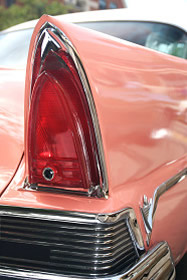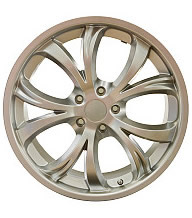Automobile Financing
by Nancy Osborne, COO of ERATE®
Financing a New Car:

The first rule, regardless of the source of financing, is to start by obtaining a pre-approval for the amount of the vehicle you wish to finance. This will both save you time and also demonstrate to any persons you may negotiate with that you are a serious buyer.
The second rule is to get the deal on your trade-in vehicle taken care of before pursuing your new car. Do your homework so you know what your trade-in is worth and then determine if you can sell it on your own, or if necessary in a trade-in with the dealer. Know its value so you have a basis upon which to negotiate with.
The third rule, which was emphasized in previous sections, is to do your homework in advance on the web or at the library and carefully negotiate price. Be sure to reject any vehicle options or additions which you do not want or need. Lastly, do comparison shopping at more than one dealership. Remember it is in your best interest to play one dealer off another and get the best pricing for yourself through the competitive bidding process.
Sources of Loans:
Home Equity

This can be the most cost effective way of financing a new vehicle.
The interest rate on a home equity line of credit, or a home equity loan, is typically much lower than that charged on any type of auto loan (with the exception of zero percent financing).
In addition, you also receive the benefits of a tax deduction on financing secured by your home. There are several types of loans homeowners can consider tapping into. The first is the home equity line of credit (or HELOC) and is as the name implies an open line of credit which funds can be drawn and repaid as needed. This loan has a variable rate, typically tied to the prime rate index with a margin on top of the index that is based upon the homeowner's credit rating. The nice feature of this loan is that it is great if you have a stream of purchases to make and that you pay interest only on the funds which are borrowed, not on the credit line maximum, unless you draw funds up to the line's max. The second type of equity loan is the traditional second mortgage. This loan is good for fixed purchases, when you know precisely how much money you will need, and want a fixed rate and a regular payment schedule upon which to repay the loan.
Auto Dealerships

Increased competition has made dealer financing an option worthy of serious consideration. And in today's competitive environment, dealers may earn more of their profit on auto financing than they do on actual vehicle sales. The dealer may offer a rate lower than that of banks or credit unions because of volume discounts they generate in automotive lending. Therefore a dealer who places a large chunk of business with a particular lending institution may be able to swing a better deal with a lender than you could obtain on your own.
- Zero Percent Financing – the best available deal. Auto manufacturers will make these deals typically to promote sales of a particular model vehicle. Because of significant world-wide competition, both U.S. and foreign auto makers have been promoting these deals like crazy. The big three automakers were offering both cash rebates in addition to 0% financing for up to 5 years. A wide selection of models was offered under these unbelievable terms. This is essentially free money so even if you could afford to pay cash for your vehicle, you will come out ahead, all other things being equal, from holding onto the cash and investing it wisely. At the time when payments on the vehicle become due, you can make payments of the principal and pocket the return on the investment.
Credit Unions

It is widely thought that Credit Unions can be a more cost effective source of auto financing than are banks and other financial institutions. Credit Unions are a good financing resource because they are known to negotiate on a large scale basis with the local auto dealers for the purpose of guaranteeing special low rates for their members. Credit Unions may also prove to be helpful in providing information on a vehicle's true cost which could be useful in your price negotiations with the dealer. Also note that Credit Unions offer auto loans which function in a way similar to that of a lease and also offer 100% financing.
Banks

Types of Loans Typically Offered:
Simple interest loan – with this type of loan you pay interest only on the remaining outstanding or existing balance on the loan. As you make each payment, you are consistently paying down principal and reducing the outstanding balance on the loan you are paying interest on.
Front-end installment loan – with this type of loan interest is paid on the original loan amount borrowed each and every month. Unlike the simple interest loan, the interest paid per month is not based on the declining loan balance but rather on the original loan amount borrowed to purchase the vehicle. Watch for an installment loan agreement which indicates that interest is calculated by the “Rule of 78”. This is a clear sign that the loan is front-end loaded. Rule of 78 means that most of the early payments will be applied only to interest and not to principal.
In summary, opt for the simple interest loan over the front-end installment loan. It is the vastly superior choice.
Financing a Used Car:

It is commonly thought that new vehicles loose as much as 20-30% when they are driven off the dealer's lot and up to 35-40% of their value within the first year. When pursuing financing on a used car, anticipate paying 2-3% above the financing rate paid on a new vehicle.
Subprime Financing:

On a used car, you may be in for a surprise, that is, a rate up to 15%+ higher than that of prime used car financing. Note that if you are turned down for credit for any reason, the lender must tell you why. Always ask for a copy of your credit report and review it for any possible errors.
Web Resources:
Financing Rules to Remember:
Rule #1 First and foremost again, negotiate the best price on your selected vehicle. Do your homework on the web or at the library and shop the car you want at more than one dealership. Do not fall prey to the salesperson's attempt to force unwanted options and extras onto your new vehicle.
Rule #2 Borrow using home equity if at all possible. This will be the cheapest most cost effective and tax efficient way to finance your vehicle. But first check with the dealer to see if a zero percent financing option is available on the vehicle you've selected then weigh both options.
Rule #3 Make the largest down payment possible as the more you are able to put down, the cheaper your overall cost of financing will be in the long run. Watch for and utilize any cash rebates offered to your advantage. If a rebate is in fact offered on the vehicle you've selected, have it work to your advantage and apply it directly to your down payment to reduce the amount of the loan and thus your monthly payment as well as the total financing cost.
Rule # 4 Never finance a vehicle for a period longer than you expect to keep it. With a depreciating asset such as a car, keep the loan term as short as possible. This way you can avoid paying for your new vehicle in conjunction with other older vehicles which are no longer of primary use. To avoid this financially unproductive cycle, try to repay the loan over 3 to 4 years even if financed by a home equity loan. This concept should be applied to used car loans as well.
Rule #5 Reject a low monthly payment strategy. Most consumers are all too concerned with the monthly outflow of their payments and not focused enough on the total cost of the financing the vehicle. Lower monthly payments will undoubtedly rack up your financing costs. Also avoid variable rate loans that could increase as much as 2-3% on you within a year. Stick with a fixed payment plan on all loans other than that of the home equity line of credit and in all other cases opt for a simple interest loan.
Rule #6 Check out all your possible financing sources carefully. Compare the deals offered by the dealer, your bank and by all means shop a rate with a credit union. Don't make a hasty decision and remember it's best to set up your financing first and to have an auto loan pre-approval in hand when approaching the dealer's lot if possible.
Rule #7 Watch for pre-payment penalties and any additional fees charged in the event that you may wish to and be capable of paying off your loan early. Also verify that the lender will actually permit you to pre-pay the loan under any conditions. Typically loans with pre-pay penalties occur on loans that are front-end loaded, which can also apply when the “Rule of 78” is in effect.
 Nancy Osborne has had experience in the mortgage business for over 20 years and is a founder of both ERATE, where she is currently the COO and Progressive Capital Funding, where she served as President. She has held real estate licenses in several states and has received both the national Certified Mortgage Consultant and Certified Residential Mortgage Specialist designations. Ms. Osborne is also a primary contributing writer and content developer for ERATE.
Nancy Osborne has had experience in the mortgage business for over 20 years and is a founder of both ERATE, where she is currently the COO and Progressive Capital Funding, where she served as President. She has held real estate licenses in several states and has received both the national Certified Mortgage Consultant and Certified Residential Mortgage Specialist designations. Ms. Osborne is also a primary contributing writer and content developer for ERATE.
"I am addicted to Bloomberg TV" says Nancy.
When considering financing options for a new car, it's essential to remember that a home equity loan can often provide the most cost-effective solution. By leveraging the equity in your home, you can access lower interest rates and even benefit from tax deductions. Additionally, exploring financing through credit unions can be advantageous, as they often negotiate special low rates for their members and provide valuable information on vehicle costs. As you navigate the financing process, keep in mind the importance of negotiating the best price for your chosen vehicle, maximizing your down payment, and avoiding long loan terms to minimize overall financing costs. Finally, always scrutinize the terms of the loan for pre-payment penalties and additional fees to ensure flexibility in managing your finances effectively.

Automotive Loans: Trading in a Car
Automotive Loans: What Laws Protect Car Buyers?
Automotive Loans: Trade In or Sell a Car?
Automotive Loans: Is Zero Percent Financing Really Possible?
Automotive Loans: Determining a Down Payment
Automotive Loans: The Truth About "Add-Ons"
Automotive Loans: Top 5 Mistakes When Buying a Car
Automotive Loans: Shopping Online
Automotive Loans: Dealer Incentives to Buy
Automotive Loans: Car Buying Incentives
Automotive Loans: Should You Buy New or Used?
Automotive Loans: What to Know About Interest Rates
Automotive Loans: Negotiating a Loan with a Dealer
Automotive Loans: How Much Car Can You Afford?
Automotive Loans: Understanding Typical Loan Language
Automotive Loans: Types of Financing
Automotive Loans: Buying Vs Leasing
Automotive Loans: Applying for a Car Loan

Buying a Car: Standard and Extended Warranties
Car Buying: Financing Background and Steps
Leasing a Car: Two Types of Leases - Closed & Open
Buying a Used Car: Two Options
Buying a Car: 5 Steps to Find the Perfect Deal
Automobile Buying/Financing

5 Steps to Find the Perfect Car
Auto loan defaults to rise 7 percent in 2010
Auto Show Season Tips for Buyers
When is the Best Time to Buy a New Car?
Making a Vehicle Purchase? Enjoy These Helpful Tips
Chances are, your next car will be used. Drive a hard bargain
What your car is really saying
2012 President's Day auto sales among best ever
Special Report: Hitting the Brakes on Auto Dealer Loans
Auto Insurance
Buying Ins - Shopping for Insurance
Best Car Insurance Plan for You


